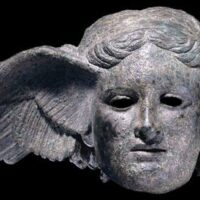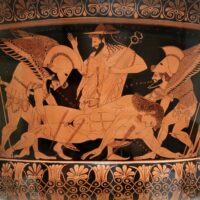Hypnos : God of Sleep
Listen
At a glance
| Description | |
|---|---|
| Origin | Greek Mythology |
| Classification | Gods |
| Family Members | Nyx (Mother), Erebus (Father), Thanatos (Brother) |
| Region | Greece |
| Associated With | Sleep |
Hypnos
Introduction
In the world of ancient Greek mythology, Hypnos stands as a quiet but powerful figure—the god of sleep. His name, quite literally meaning “sleep” in Greek, reflects the essence of his being. Unlike gods of thunder or war, Hypnos governs something more subtle yet universally vital: rest. Far from being just a mythical character, Hypnos’s legacy flows through centuries of culture, literature, psychology, and symbolism.
Physical Traits
Often envisioned as a serene and youthful deity, Hypnos is depicted with an air of tranquility. Wings sprouting from either his temples or shoulders are his most recognizable feature, signifying his ability to move swiftly and silently through the world, casting sleep wherever he travels. His appearance is not fearsome or commanding, but rather peaceful—embodying the nature of sleep itself.
Ancient texts and art portray him holding symbols closely tied to dreams and unconscious states: a poppy flower, known for its sedative properties; a horn from which sleep-inducing liquid flows; or even a branch dripping with water from the River Lethe, which represents forgetfulness. At times, Hypnos is said to take the shape of a bird, gently fluttering across the skies to deliver slumber.
Family
Hypnos hails from a lineage as old as existence itself. Born to Nyx, the embodiment of night, and Erebus, the god of darkness, he is a primordial being—meaning he predates the Olympians and other familiar deities. This origin speaks volumes: sleep, like night, is ancient, inescapable, and essential.
His twin brother is Thanatos, the personification of death. In Greek thought, sleep and death were considered closely related, even akin to siblings. This connection wasn’t seen as grim, but rather as a natural transition—peaceful death mirroring restful sleep. Hypnos’s presence represents recovery and renewal, the calm after chaos.
His wife, Pasithea, is one of the Charites (Graces), often associated with relaxation and hallucinatory states. Together, they are parents to the Oneiroi, divine beings who craft dreams. Among their children, Morpheus is the most renowned, shaping dreams into human forms and narratives. Through them, Hypnos extends his influence from simple rest into the deeper, more mysterious realm of dreaming.
Other names
The Romans knew Hypnos as Somnus, and the Latin language retained much of the reverence Greeks had for the deity. Through Latin literature and art, Hypnos evolved into a more widespread cultural figure across the ancient world. He also appears under various epithets, each reflecting an aspect of his nature. “Epidotes,” meaning “bountiful,” highlights his gift of rest. Another name, “Pannikitis,” or “All-Vanquisher,” suggests the inescapable nature of sleep—even gods are not immune to his touch.
His name forms the root of the modern word “hypnosis,” further connecting the ancient world to contemporary psychology. This linguistic inheritance underlines just how influential the concept of Hypnos remains in our understanding of altered consciousness and the subconscious mind.
Powers and Abilities
What makes Hypnos especially unique among Greek gods is his influence over both mortals and immortals. In Homer’s Iliad, he famously aids Hera in deceiving Zeus, the king of the gods, by putting him into a deep slumber. This act, subtle yet monumental, demonstrates that even the most powerful beings cannot resist his pull. Beyond inducing sleep, Hypnos can shape the nature of one’s rest. Through his children—the Oneiroi—he can send prophetic dreams, illusions, or nightmares. His presence is said to be felt wherever people doze off, suggesting a divine omnipresence within his sphere.
Legends also tell of his hypnotic voice, a melodic cadence capable of soothing minds into serenity. This concept mirrors the modern therapeutic use of hypnosis, where speech and suggestion are used to reach altered mental states for healing or insight. Though not as glorified in temples or grand tales as some Olympians, Hypnos’s gentle strength made him one of the few entities able to affect divine events through non-violent means.
Modern Day Influence
The legacy of Hypnos quietly persists. His name is immortalized in psychological terminology—hypnosis, hypnotherapy, and even in scientific terms related to sleep studies. Fields exploring sleep disorders or dream research frequently reference Hypnos, not just in etymology but as a metaphor for the mysteries they seek to unravel.
In art and literature, Hypnos continues to inspire creators. Writers and musicians often use his name and imagery as metaphors for introspection, escape, or the surreal worlds of dreams. His likeness—whether winged or poppy-bearing—appears in logos, fantasy stories, and even modern video games and comics, often symbolizing rest, illusion, or hidden realms of the mind.
Interestingly, despite being a relatively minor deity in ancient texts, Hypnos has become more culturally relevant in the modern era. As society grows increasingly interested in wellness, sleep hygiene, and the psychology of dreams, his symbolic role feels more important than ever.
Films and novels sometimes depict him or figures inspired by him as calm manipulators, gentle guides through the subconscious, or even as enigmatic gatekeepers to dream worlds. While these interpretations vary, they reflect a lasting fascination with what Hypnos embodies: surrender, healing, and the unseen journeys we take when we close our eyes.
Related Images
Source
Wikipedia. “Hypnos.” https://en.wikipedia.org/wiki/Hypnos
HYPNOS – Greek God of Sleep (Roman Somnus). (2000). https://www.theoi.com/Daimon/Hypnos.html
Facts and Information on the God Hypnos – The Greek God Of Sleep. (2024). https://greekgodsandgoddesses.net/gods/hypnos/
Hypnos | God of Sleep, Dreaming & Death – Britannica. (2025). https://www.britannica.com/topic/Hypnos
duygubruce. (2019). Hypnos, the God of Sleep and his Powers – Savants and Sages. https://savantsandsages.com/2019/07/06/hypnos-the-god-of-sleep-and-his-powers/
Hypnos – Greek Legends and Myths. (n.d.). https://www.greeklegendsandmyths.com/hypnos.html
Frequently Asked Questions
What is lorem Ipsum?
I am text block. Click edit button to change this text. Lorem ipsum dolor sit amet, consectetur adipiscing elit. Ut elit tellus, luctus nec ullamcorper mattis, pulvinar dapibus leo.
What is lorem Ipsum?
I am text block. Click edit button to change this text. Lorem ipsum dolor sit amet, consectetur adipiscing elit. Ut elit tellus, luctus nec ullamcorper mattis, pulvinar dapibus leo.
What is lorem Ipsum?
I am text block. Click edit button to change this text. Lorem ipsum dolor sit amet, consectetur adipiscing elit. Ut elit tellus, luctus nec ullamcorper mattis, pulvinar dapibus leo.
What is lorem Ipsum?
I am text block. Click edit button to change this text. Lorem ipsum dolor sit amet, consectetur adipiscing elit. Ut elit tellus, luctus nec ullamcorper mattis, pulvinar dapibus leo.
What is lorem Ipsum?
I am text block. Click edit button to change this text. Lorem ipsum dolor sit amet, consectetur adipiscing elit. Ut elit tellus, luctus nec ullamcorper mattis, pulvinar dapibus leo.












